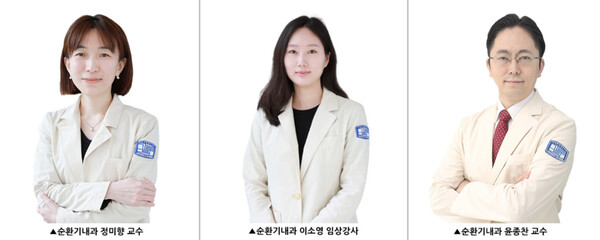More than one million Koreans are living with cancers as survival rates have improved thanks to the development of early detection, surgical treatment, and a variety of effective cancer therapies.

While the cancer treatment has improved, a St. Mary's Seoul Hospital team, led by Professors Jung Mi-hyang, Youn Jong-chan, and Doctor Lee So-young, has found that high blood pressure in cancer patients is not well managed.
Hypertension is a leading cause of uncontrolled cardiovascular disease and death in cancer patients and cancer survivors.
However, cancer patients with hypertension and their doctors are often focused on treating the cancer and preventing recurrence.
More alarmingly, the St. Mary's research team found that two-thirds of Korean cancer patients are not taking their antihypertensive medications, which increases the risk of hospitalization and mortality from cardiovascular disease.
The team concluded so after using the National Health Insurance Service-National Sample Cohort database from 2002 to 2013 to look at adult cancer patients who were prescribed antihypertensive medications.
To determine the effectiveness of the prescribed treatment regimen, the team defined and categorized patient adherence as the number of days the patient took the medication divided by the total number of days the patient was prescribed, also known as the medication possession ratio (MPR).
Patients were divided into good (MPR ≥ 0.8), fair (0.5 ≤ MPR < 0.8), and poor (MPR < 0.5).
The primary outcome measures were overall mortality and cardiovascular mortality, and the secondary outcome measures were cardiovascular events requiring hospitalization for major cardiovascular events.
The results showed that of the 19,246 cancer patients with hypertension, 66.4 percent were not adherent to their antihypertensive medication. Of these, 26.3 percent had fair adherence and 40 percent had poor adherence.
By age, 81.8 percent of patients aged 20-24, 84.2 percent of patients aged 25-29, and 73.4 percent of patients aged 30-34 were in the poor adherence group, indicating that younger cancer patients were more likely to be non-adherent to their hypertension medications.
During a mean follow-up of 8.4 years, there were 2,752 deaths and 6,057 cardiovascular events.
Compared to the good adherence group, the fair and poor adherence groups had a 1.85- and 2.19-fold increased risk for overall mortality and a 1.72- and 1.71-fold increased risk for cardiovascular mortality.
Also, the fair and poor adherence groups had a 1.33- and 1.34-fold increased risk for new cardiovascular events.
The team confirmed that such trends were consistent across subtypes of cardiovascular events.
"The development of anticancer drugs has increased the survival time of many cancer patients, but hypertension control is often neglected due to the focus on cancer treatment and recurrence," Professor Jung said. "Even after successful cancer treatment, uncontrolled hypertension can lead to serious cardiovascular events requiring hospitalization."
As a result, cancer patients need to be more vigilant about taking their antihypertensive medications, she added.
Professor Youn also said, "The reasons for poor adherence to antihypertensive medications among cancer patients may be due to the need to take many prescription medications multiple times a day, as well as the depression caused by the disease, which makes it difficult for patients to take care of their own medications."
As a solution, Youn said it is important to prescribe a single combination pill to simplify medication intake, and to provide sufficient consultation and multidisciplinary medical support to manage complications.
The results of the research were published in the Journal of the American Heart Association.

